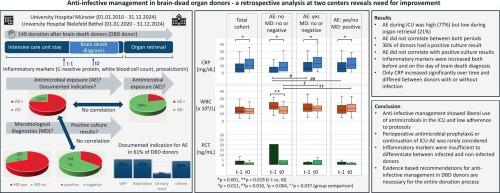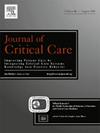脑死亡器官供者的抗感染管理-两个中心的回顾性分析显示需要改进
IF 2.9
3区 医学
Q2 CRITICAL CARE MEDICINE
引用次数: 0
摘要
背景充分的供体管理是增加可移植器官数量的关键。没有关于器官供体抗感染管理的具体建议,并且稀疏的文献表明抗菌剂的使用过于随意。我们分析了脑死亡供者的抗感染管理,以补充有限的证据。方法回顾性分析本文章由计算机程序翻译,如有差异,请以英文原文为准。

Anti-infective management in brain-dead organ donors – A retrospective analysis at two centers reveals need for improvement
Background
Adequate donor management is essential to increase the number of transplantable organs. No specific recommendations about anti-infective management for organ donors are available and the sparse literature indicates that antimicrobials are used too liberally. We analyzed anti-infective management of brain-dead donors to add to the limited evidence.
Methods
All brain-dead donors at the University Hospitals Münster (2010–2024) and Bielefeld Bethel (2020–2024) were retrospectively included. The use and indication of antimicrobials, microbiological diagnostics and inflammatory markers were assessed during intensive care unit stay and organ retrieval.
Results
149 donors were included, 76.5 % received antimicrobials in the intensive care unit and 21.5 % during organ retrieval. Antimicrobial exposure did not correlate between both periods. Indication for antimicrobials was documented in 61 % of donors, with aspiration pneumonia (33 %) and ventilator-associated pneumonia (33 %) being the most common diagnoses. Positive microbiological cultures were found in 36 % of donors but without correlation to antimicrobial exposure or length of exposure. The proportion of donors with out of normal range values for C-reactive protein (67–100 %), white blood cell count (53–88 %) and procalcitonin (22–43 %) was high, but only C-reactive protein differed between the day before and the day of brain death diagnosis and between infected and non-infected donors.
Conclusion
Antimicrobial use was high during intensive care unit stay, low during organ retrieval and inconsistent between both periods. Inflammatory markers were insufficient to indicate infection. Aggravated by a lack of evidence-based recommendations, this indicates inadequate anti-infective management of DBD donors, which may have a negative impact on the organ recipient.
求助全文
通过发布文献求助,成功后即可免费获取论文全文。
去求助
来源期刊

Journal of critical care
医学-危重病医学
CiteScore
8.60
自引率
2.70%
发文量
237
审稿时长
23 days
期刊介绍:
The Journal of Critical Care, the official publication of the World Federation of Societies of Intensive and Critical Care Medicine (WFSICCM), is a leading international, peer-reviewed journal providing original research, review articles, tutorials, and invited articles for physicians and allied health professionals involved in treating the critically ill. The Journal aims to improve patient care by furthering understanding of health systems research and its integration into clinical practice.
The Journal will include articles which discuss:
All aspects of health services research in critical care
System based practice in anesthesiology, perioperative and critical care medicine
The interface between anesthesiology, critical care medicine and pain
Integrating intraoperative management in preparation for postoperative critical care management and recovery
Optimizing patient management, i.e., exploring the interface between evidence-based principles or clinical insight into management and care of complex patients
The team approach in the OR and ICU
System-based research
Medical ethics
Technology in medicine
Seminars discussing current, state of the art, and sometimes controversial topics in anesthesiology, critical care medicine, and professional education
Residency Education.
 求助内容:
求助内容: 应助结果提醒方式:
应助结果提醒方式:


